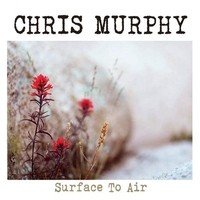
Chris Murphy’s quarter century long journey as a professional musician embodies the idea of calling versus vocation. There’s a tremendous amount of hard work and routine that professional musicians, like any laborer, endures to deliver their product. It isn’t uncommon to hear many veteran musicians say that they’re paid for their travel; the gigs are free. Murphy’s circuitous route into this calling has a strong sense of destiny – some people write and perform songs that make it all too apparent they would continue doing so even if no one were listening. Music like that comes from somewhere deep within, some critical area, and Chris Murphy numbers among its practitioners. His latest album Surface to Air is a fourteen song collection that will impress long time fans and win over new converts by the score.
URL: http://chrismurphymusic.com/music/
The album’s first track, “Sailing the World Alone”, casts Surface to Air, at least initially, in the mold of a roots record. It’s a breezy, uptempo song with light country music influences running through the song. The song’s lyrics convey its message with a minimum of dross and Murphy’s vocals have a natural intonation, relaxed and virtually conversational, capable of disarming listeners from the outset on. Rambunctious swing dominates “That Just Might Do the Trick” and Murphy’s violin, as ever, is close to the front of the mix and leading the way. There’s a memorable contrast between the vamps of the song’s main theme and the restrained, stripped back verses that helps add to the tune’s tension and momentum. The album’s title track has a distinctly different air – simmering, low key rock with judicious spikes of biting electric guitars. “Surface to Air” boasts one of the album’s finest choruses too and it’s made all the sweeter by the band’s seamless transition from the verses.
“Vernon Tool & Die” shows off Murphy’s diversity with its waltz tempo and strong narrative qualities. His lyrical violin playing is ably matched by an array of equally eloquent guitar lines. Unlike other performers, there’s no discernible sense of discomfort from Murphy’s handling of various styles. The lyrics have strong storytelling virtues, but they are just specific enough that the balance between inaccessibility/exposure compared to deeper resonance with the material all but vanishes. “Last of the Twickham Blackbirds” is built around an outright guitar riff, albeit composed on acoustic guitar, augmented with some of the album’s typical country inspired instrumentation. Murphy’s violin slices through the mix for extended and highly melodic fills. Murphy turns again to the waltz form for “The Oscar Wilde Waltz” and his patiently unfurling violin phrases guides this beautifully conceived instrumental.
“Bugulusa Blues” is one of the album’s longest songs, but pops throughout with convincing energy that doesn’t relent and holds the listener’s attention with a number of subtle variations in the arrangement. Loading more instrumental tracks onto the album’s second half rather than apportioning them in a more balanced way suggests it might negatively alter the release’s creative dynamics, but that hasn’t been the case at all. The instrumentals share a lot in common with the lyrically driven songs and mark the evolution in the album’s mood. Surface to Air ends with “The Hunter & the Fox”, an outright pastiche of European folk scoring big here. The moody melodicism carrying it along is crucial to its success.
This is an extraordinarily expansive album invoking a handful of wildly varied musical voices and an example of pure songwriting technique, refined without regard for fame or financial windfall. Chris Murphy’s journey has taken him far afield from his New York City childhood and Surface to Air will ultimately rate as one of the biggest statements in his journey.
9 out of 10 stars.
I-TUNES: https://itunes.apple.com/us/album/surface-to-air/id1078464191
Jason Hillenburg
